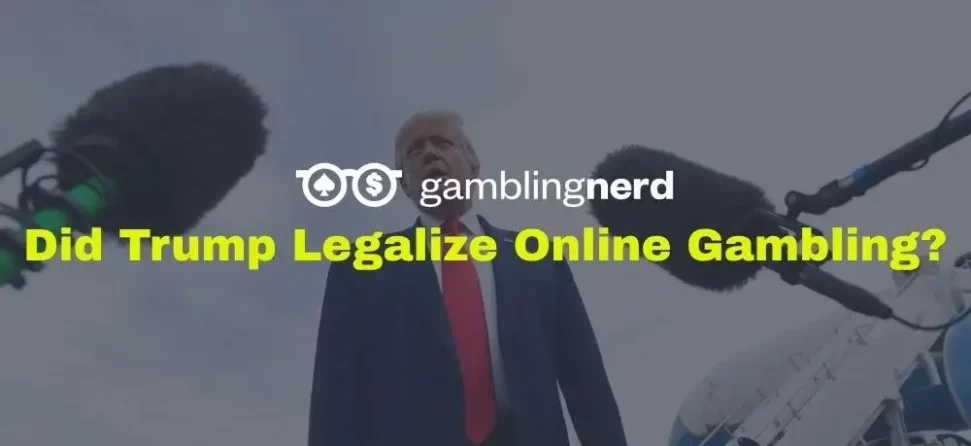Did Trump Legalize Online Gambling?

As a former casino owner, Donald Trump seemed like the savior the online gambling industry needed when he was elected in 2016. But his efforts were anything but helpful to online operators.
In his second term, gambling once again became one of his administration’s focuses. But did Trump legalize online gambling the second time around?
Unfortunately, no. His efforts instead fell on the other side of the line with new gambling taxation requirements ushered in with the Big Beautiful Bill.
The Big Beautiful Bill Does Not Legalize Online Gambling
In July 2025, the Trump administration’s One Big Beautiful Bill passed into law, issuing changes to gambling taxation. The BBB did not legalize online gambling at a federal level.
Under the new law, gamblers can only deduct 90% of their gambling losses on their tax returns. This means that for every $100 lost, you’re only writing off $90 in losses. That unaccounted-for $10 becomes taxable income.
This law has severe implications for the regulated gambling market, which is required to perform reporting on payouts, losses, etc. Why gamble at a regulated establishment when gambling at an offshore site could save you 10%?
Regardless of the consequences of the Big Beautiful Bill’s new gambling taxation clause, it has muddied the waters when it comes to Trump’s stance on gambling.
Trump’s Stance on Legalized Gambling
Trump’s political flip-flopping makes it difficult to determine what his actual stance on gambling legislation is.
In the early 90s, a concerted push to bring legalized sports betting to New Jersey had drawn sharp lines in the sand. On one side, Trump and similar businessmen advocated for bringing sports betting to Atlantic City under the guise of “lowering taxes.”
The truth of the matter is that the support Trump gave for legalization efforts was for his own benefit. By that time, the Trump Taj Mahal had already defaulted on the junk bonds used to finance the casino, and any additional income would help fend off the raging interest rates on his $675 million worth of debt.
When not in his interest, Trump’s opposition to growing the gambling market is clear.
In 1993, Trump was invited to a congressional hearing on the regulation of Indian gaming. When asked for his opinion, he “alleged the prospect of organized crime activities in Indian gaming,” among other things. His claims were unsubstantiated and eventually debunked.
A year later, he opposed development of an Indian gaming market in South Bend, Indiana. And in the 2000s, he opposed the St. Regis Mohawk tribe’s push to build a casino in the Catskills.
Fast forward fifteen years, his administration moved to change the interpretation of the Wire Act of 1961 during his first term. The Wire Act was originally intended to combat illegal bookies and gang-affiliated, cross-country crime. It has since been used to ban online sports betting prior to the overturn of PASPA.
In 2017, the Trump administration’s officials in the Department of Justice moved to throw a “potential haymaker at all online gambling, including poker, lotteries, and potentially even daily fantasy sports,” by arguing that the Wire Act did not just apply to sports betting, but all online gambling activities.
After months of legal back and forth, the movement was eventually dismissed, but it stands out as one of Trump’s more curious actions.
And of course, in his second term, the Big Beautiful Bill makes writing off gambling losses more difficult.
Conflicts of Interest or a Portent of the Prediction Market?
If you’re not already confused about the Trump administration’s stance on gambling, you will be.
Donald Trump Jr., the president’s eldest son, has no official spot in the White House or the Trump administration despite being a critical part of the reelection campaign. He brokered relationships with JD Vance, RFK, and other members of his father’s administration during the run-up to the 2024 election. However, Trump Jr. still holds his father’s ear and is a valuable confidant to the president.
Post-election, Trump Jr. started working with the venture capital firm 1789 Capital. The firm was developed in 2022 by members of Vance’s Rockbridge Network and other wealthy conservative figures. The company’s goal is to invest in “late-stage technology companies with IPO potential” that embody entrepreneurial and innovative ideas.
In August 2025, Trump Jr. announced that 1789 Capital would be investing in Polymarket, a public betting platform powered by cryptocurrency, and that he would be joining the team as a strategic advisor.
Polymarket was in hot water in 2022 during a probe from the Commodity Futures Trading Commission and the DOJ, in which their US operations ground to a halt. However, Trump rolled back cryptocurrency regulation and ended the probes into Polymarket in July 2025.
Not long after, Polymarket purchased QCX, a derivatives exchange company certified by the CFTC, for $112 million. Since the exchange is registered with the CFTC, it gives Polymarket a legal boot in the door to the US betting market once again.
Trump Jr. is also a strategic advisor for Kalshi, another public betting platform. According to Games Hub, Kalshi raked in $300 million from a funding run earlier this month and immediately launched betting services in 140 countries.
With interests in both Polymarket and Kalshi, Trump Jr. is poised to have a leading say in the future of betting platforms in the US.
Is his involvement with such platforms a conflict of interest, what with being so close to the president? Or is this a move by Trump Jr. to influence the movement of the online betting scene outside of politics?
The Future of Legal US Online Gambling is Murky
Donald Trump’s Big Beautiful Bill did not legalize online gambling in the US, but it did make filing gambling taxes a bit more confusing.
Trump’s personal and business connections to the gambling scene in the past made it seem likely he would ease restrictions on online gambling, but that was not the case in his first term.
But, with his son’s involvement with betting markets like Polymarket and Kalshi, some kind of further deregulation might be on the horizon.




